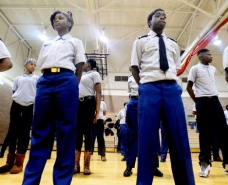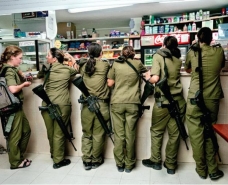Publicity campaigns in public spaces

The German Bundeswehr in the struggle for the hearts and minds of the German people
Small and ready to fight. In spite of a general reduction in personnel, the German Bundeswehr (Armed Forces) should in the future be more fit for action: 10,000 German soldiers should be able to be deployed abroad at any time, instead of the current 7,000 . But since the suspension of conscription, the German Armed Forces have to meet their recruitment needs entirely by persuading the civilian population to join in: 170,000 (career soldiers, soldiers on contract, reservists), plus 5,000 (soldiers recruited for voluntary military service), plus X (less than 10,000 additional soldiers recruited for voluntary military service) – equal less than 185,000 soldiers. This calculation was presented by German Minister of Defence Thomas de Maizière (Christian Democrats) in a policy speech in Berlin on 18 June 2011. Presently, it does not seem to be a problem for the German Bundeswehr to find 5,000 new recruits every year. But it is less clear whether they can meet the more ambitious target of 15,000 new recruits annually, because conscription was only suspended in summer 2011 and up to now not all the figures on new recruits (and drop-outs) of the last quarters are available.
But there is also another reason for the increasing public presence of the German Bundeswehr: “The Germans trust their Bundeswehr, and rightfully so, but real interest or even pride in it are rather rare. Even more rare are the wish and an attempt to understand and assess the changed foreign and security policy, which is impacting the German Bundeswehr. Of course we can name reasons for this friendly disinterest”, said the former German president Horst Köhler (Christian Democrats) in an oft-quoted speech at the “Commanders conference of the Bundeswehr” in Bonn in 2005. Among the reasons for this “friendly disinterest”, Köhler cited the experience of World War II and the lack of a sense of threat. But besides disinterest there is a stable majority within Germany which views German military operations abroad critically. For example, about 60% to 70% of the German population have opposed the deployment of the Bundeswehr in Afghanistan for years and have demand a fast withdrawal of German troops. This means that whenever the German military presents itself in public, the polishing of the public image of the German Bundeswehr is always part of it, so that in the future, the Bundeswehr can go to war not just with the support of the German parliament, but also with the support of the German people.
In city centres
In 2006, acting on advice from the “Bundeswehr Institute of Social Sciences“, the army created a new unit called “The Central Fairs and Event Marketing Department of the Bundeswehr” (ZeMEmBw), which is a new promotional unit. Since then, the Bundeswehr is promoting enlistment as “a career with a future”. The flagship of this promotional unit is the so-called “Career Meeting Point” (KarriereTreff), consisting of three large trucks – the “career truck”, the “cinema truck”, and the equipment truck. These trucks tour all over Germany all year round and visit about 40 cities a year, where they are positioned on central places or at public events. The second tool of the unit is a large booth for fairs, which is used about 50 times every year. With this booth the Bundeswehr is present, for example, at “gamescom”, Europe’s largest video games fair, as well as at medical congresses, where it attempts to counter its massive shortfall of medical personnel.
On top of the “Central Fairs and Event Marketing” unit, all four military subdistrict commands (North, East, South, and West) have their own “Bundeswehr Centres for Recruitment” (ZnwgBw). Each of these units has two booths for fairs, which are smaller but not less modern than the one held by “Central Fairs and Event Marketing”, and four smaller promotion trucks, which are used for career advice and the distribution of brochures. Almost all promotional events of all the above-mentioned units also include exhibiting military equipment – tanks, helicopters, etc.
Military ceremonies
The number of public military oath ceremonies outside military barracks increased, especially under the leadership of former Minister of Defence Franz Josef Jung (Christian Democrats): while there were 134 public ceremonies in 2007, this increased to 180 ceremonies in public places in 2009. In 2008, the large military oath ceremony which is part of the annual public remembrance day for the attempted assassination of Adolf Hitler on 20 July, was for the first time moved from the “Bendlerblock”, the Berlin seat of the Ministry of Defence, to the Reichstag, the German parliament. In recent years, these ceremonies were broadcast live by the public TV broadcaster Phoenix. Because the suspension of conscription also means a reduction in the number of new recruits, it is to be expected that the overall number of such ceremonies will go down – whether this reduction also includes public oath ceremonies, or only those held in military barracks, is presently not clear.
In addition, there are between 20 (2006) and 7 (2010) traditional major military ceremonies (so-called “grand tattoos”, “Großer Zapfenstreich”), which also might be broadcast live, for example when a President or Minister of Defence stands down. More recently, the increasingly elaborated memorial services for soldiers killed in action are sometimes broadcast live by public TV channels, and the recent first award of the “Bundeswehr cross medal for bravery” in 2009 fits well with this establishment of a new cult of soldiering and heroism. Shortly after the creation of the medal for bravery, a new “Bundeswehr cenotaph” was opened in Berlin, giving tribute to dead soldiers.
Additionally, the 18 Bundeswehr military bands, which perform more than 3,000 concerts annually, play a not unimportant role in the promotion of a positive image for the Bundeswehr.
Advertising in the media
The Bundeswehr spent 15 million Euro from 2006 to 2009 on advertising in print media, radio and cinema. Between 2009 and 2011, the expenses for recruitment-related advertising alone have risen to more than 5.7 million Euro annually. The Bundeswehr advertises regularly in Germany’s largest school magazine, the SPIESSER, with a circulation of more than 1 million. In addition, the Bundeswehr targets youth with advertising on the radio and in the cinema, especially focused on recruiting new helicopter and fighter jet pilots. Finally, in spring 2010 and 2011, for the first time in years, the Bundeswehr used TV advertising. The 20 seconds commercial, which cost 189,000 Euro, directly promoted the use of weapon systems: “Mastering challenges, proving team spirit, mastering technology. Bunderwehr – a career with a future”, and later also with the slogan “Bundeswehr reform – Your opportunity”. Presently there are two running TV commercials by the armed forces with the new promotional slogan: “We. Serve. Germany” (Wir. Dienen. Deutschland), aiming to get young people interested.
Militainment
To improve its image further, the Bundeswehr also increasingly subsidises German film production: in 2005 – 11 films, in 2006 – only 4, in 2007 – 8, in 2008 – already 12, and in 2009 the Bundeswehr supported 22 films. It provides film producers large military equipment, the permission to film on military facilities, and even financial support. The Bundeswehr especially supports films, TV series, and documentaries which present the Bundeswehr in a positive light or are otherwise helpful to the armed forces.
Apart from that, the Bundeswehr – possibly because it receives more international attention due to its operations abroad – is increasingly an actor in video games. Although the Bundeswehr did not so far, according to its own information, support a video game, and only published a handful of browser-based games for recruitment purposes, the Bundeswehr and the Ministry of Defence don’t mind the Bundeswehr being featured in many video games – the promotional effect is appreciated.
Conclusions and perspectives
The Bundeswehr’s attempts to be present in public spaces have markedly increased in recent years. Advertising in the media in particular should, according to the Ministry of Defence, be increased massively. In 2010, the Bundeswehr opened its first recruitment office in the Saarbrücken central railway station, which can be seen as an attempt to be permanently present in the centres of large cities. Now that conscription has been suspended, the district conscription boards are to be replaced by “career centres” and “career offices”, but how this is going to be done – whether the present district conscription boards will also include a promotion and information unit, or whether they will be closed and promotional offices will be opened in city centres instead – is not yet known. As long as the German government continues with an expansionist military policy with global military operations, military promotion at the “home front” will increase too, until a sufficient number of soldiers are recruited and the German population has been made to accept war.
Michael Schulze von Glaßer
Republished from http://wri-irg.org/node/15219
Countering Military Recruitment

WRI's new booklet, Countering Military Recruitment: Learning the lessons of counter-recruitment campaigns internationally, is out now. The booklet includes examples of campaigning against youth militarisation across different countries with the contribution of grassroot activists.
You can order a paperback version here.








